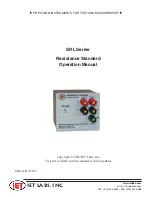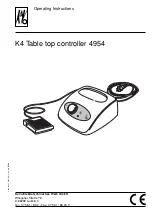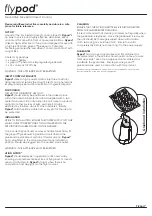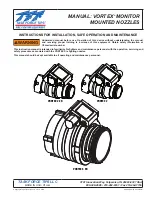
128 - Quark PFT User Manual
Staffing
Staff members should be able to do the following:
1. Establish rapport with the subject and make him or her feel comfortable.
2. Recognize normal acute and chronic responses to exercise.
3. Recognize abnormal signs and symptoms during exercise.
4. Provide basic life support measures competently.
5. Adhere to established procedures and protocols.
6. Clearly explain test results to the individual.
Test termination
Sub-maximal tests should be terminated according to ACSM or other accepted
guidelines (see table in the following). In the event of an abnormal response, the test
should be terminated, the medical director of the facility and the individual’s primary
care physician notified, and all specified follow-up procedures performed. In the event
of mechanical or electrical failure that may compromise the accuracy of the test results
or monitoring capabilities, the test should be terminated until the problem is corrected.
General Indications for Stopping an Exercise Test in Apparently Healthy Adults
Onset of angina or angina-like symptoms
Significant drop (20 mmHg) in systolic blood pressure or a failure of the systolic blood
pressure to rise with an increase in exercise intensity
Excessive rise in blood pressure: systolic pressure >260 mmHg or diastolic pressure
>
115 mmHg
Signs of poor perfusion: tight-headedness, confusion, ataxia, pallor, cyanosis, nausea, or
cold and clammy skin
Failure of heart rate to increase with increased exercise intensity
Noticeable change in heart rhythm
Subject requests to stop
Physical or verbal manifestations of severe fatigue
Failure of the testing equipment
Assuming that testing is non-diagnostic and is being performed without direct physician
involvement or electrocardiographic monitoring.
Summary of Contents for Quark PFT
Page 11: ...Getting started ...
Page 27: ...Measurements ...
Page 32: ...32 Quark PFT User Manual ...
Page 33: ...Installation ...
Page 42: ...42 Quark PFT User Manual ...
Page 43: ...Calibration ...
Page 50: ...50 Quark PFT User Manual ...
Page 51: ...Database Management ...
Page 57: ...Spirometry ...
Page 72: ...72 Quark PFT User Manual ...
Page 73: ...Lung Volumes ...
Page 78: ...78 Quark PFT User Manual ...
Page 79: ...P0 1 Respiratory drive ...
Page 82: ...82 Quark PFT User Manual ...
Page 83: ...Lung diffusing capacity ...
Page 88: ...88 Quark PFT User Manual ...
Page 89: ...MIP MEP option ...
Page 91: ...Pulse oximetry option ...
Page 93: ...Exercise testing ...
Page 116: ...116 Quark PFT User Manual ...
Page 117: ...Resting Metabolic Rate Test ...
Page 123: ...Chapter 13 Resting Metabolic Rate Test 123 ...
Page 124: ...124 Quark PFT User Manual ...
Page 125: ...Sub maximal Exercise Testing ...
Page 131: ...System maintenance ...
Page 134: ...134 Quark PFT User Manual ...
Page 137: ...Appendix ...
Page 148: ...148 Quark PFT User Manual ...
















































